September 09, 2024
Talent Central
This season marks the 50th anniversary of The Patrick G. and Shirley W. Ryan Opera Center. Here’s a brief retrospective of highlights of this extraordinary program’s evolution.
By Alana Guggenheim
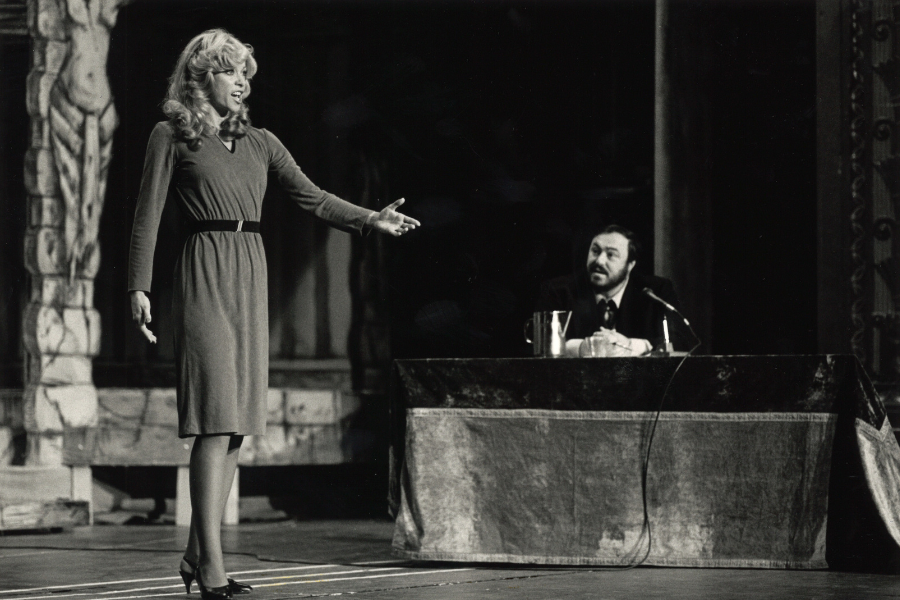
As Luciano Pavarotti looks on, Ensemble soprano Marcia Cope delivers an aria during a 1983 master class.
“It’s truly remarkable to look back on The Patrick G. and Shirley W. Ryan Opera Center’s legacy,” says Dan Novak, who has worked at the Ryan Opera Center since 2000, becoming director in 2013. Recognized globally for its standard-setting training, the Ryan Opera Center is celebrating its 50th anniversary this season, an astonishing benchmark that speaks to its innumerable successes and ongoing impact on the field. Hundreds of artists have participated in the program’s Ensemble, and dozens continue to grace stages around the globe. The roster of its instructors, mentors, and visiting artists reads as a who’s-who of the opera world. The Ryan Opera Center is indeed one of Lyric Opera of Chicago’s most significant calling cards.
Originally named the Lyric Opera School of Chicago, what is now the Ryan Opera Center was established in 1974 under the visionary leadership of then-General Manager Carol Fox, Music Director Bruno Bartoletti, and Assistant Manager Ardis Krainik. Their goal was to attract and nurture the country’s best emerging singers by providing advanced coaching and training, along with opportunities to perform in comprimario roles on the Lyric stage. The Chicago Tribune hailed the program as a groundbreaking development in local opera history.
Under the direction of the American lyric tenor and conductor Herbert Handt, the program enrolled its first cohort of 10 up-and-coming American singers, including the future internationally acclaimed contralto Kathleen Kuhlmann. One of the early highlights was the Ensemble’s own production of Domenico Puccini’s Il Ciarlatano, performed with orchestra at the University of Chicago and at Lake Forest’s Barat College, setting a precedent for excellence, collaboration, and performance opportunities that continues to define the program today.
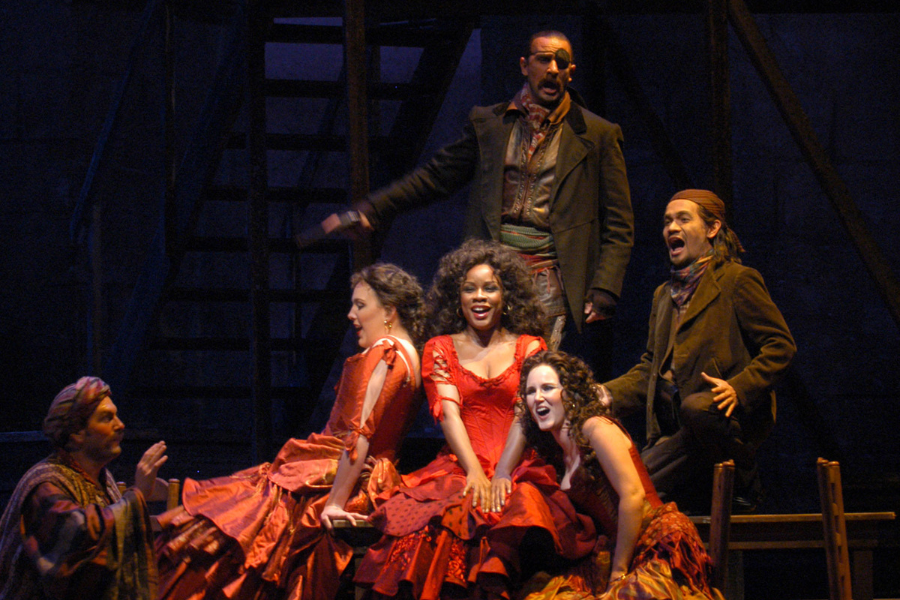
Ensemble members surround Denyce Graves in Lyric's 2005/06 Carmen. Clockwise from left: Susanna Phillips, David Cangelosi, Rodell Rosel, and Lauren McNeese.
Notable productions including Ensemble artists have become cornerstones in the Ryan Opera Center’s history. Among these, the 1990 performances and recording by New World Records of Hugo Weisgall’s Six Characters in Search of an Author stands out, showcasing the training program’s dedication to contemporary opera. In fact, Lyric’s Composer-in-Residence program was overseen by the Ryan Opera Center and resulted in several world premieres, among them The Song of Majnun (1992) by Bright Sheng, Between Two Worlds (The Dybbuk) (1997) by Shulamit Ran, and Lovers and Friends: The Chautauqua Variations (2001) by Michael John LaChiusa.
Ryan Opera Center artists have also made remarkable contributions to Lyric’s mainstage productions, often performing supporting roles as well as understudying principal roles — and, quite often, stepping in to perform them. This has not only provided invaluable experience for the artists but has also enriched Lyric Opera’s offerings with fresh and dynamic talent. Audience members won’t soon forget the last-minute, remarkable substitution of Ensemble soprano Kathryn Henry into the title role of Jenůfa in its last performance during the 2023/24 Season.
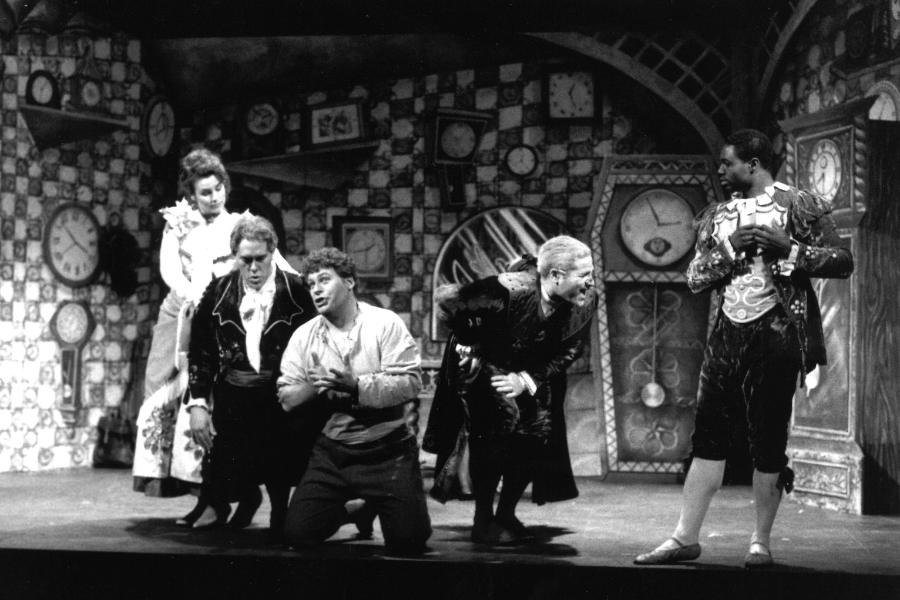
The 1993/94 Ensemble presented Maurice Ravel’s 1911 one-act comedy, L’heure espagnole.
Since its inception, the Ryan Opera Center has undergone several name changes and significant program evolutions, each reflecting a new phase in its development and mission. In 1981, the name was changed to the Lyric Opera Center for American Artists to better represent its mission of nurturing American talent who might otherwise have needed to go to Europe for post-graduate professional development. This period saw the introduction of master classes led by renowned stars like Luciano Pavarotti, Alfredo Kraus, Evelyn Lear, Sherrill Milnes, and more, enhancing the training experience for Ensemble artists.
In 2006, the program was renamed The Patrick G. and Shirley W. Ryan Opera Center in recognition of a transformative gift from the Ryans, reflecting the program’s broadened mission and elevated status within the opera community. That year was significant also due to the appointment of Gianna Rolandi as the Ryan Opera Center’s new Director, a position she held until 2013. The coloratura soprano brought with her a wealth of experience on the world’s stages, including her 1986 debut at Lyric as Dorinda in Handel’s Orlando. “It was so beneficial for our young singers to work with Gianna,” noted William Mason, Lyric’s General Director from 1997 to 2012. “She truly understood what singing was all about and what it meant to have a career."
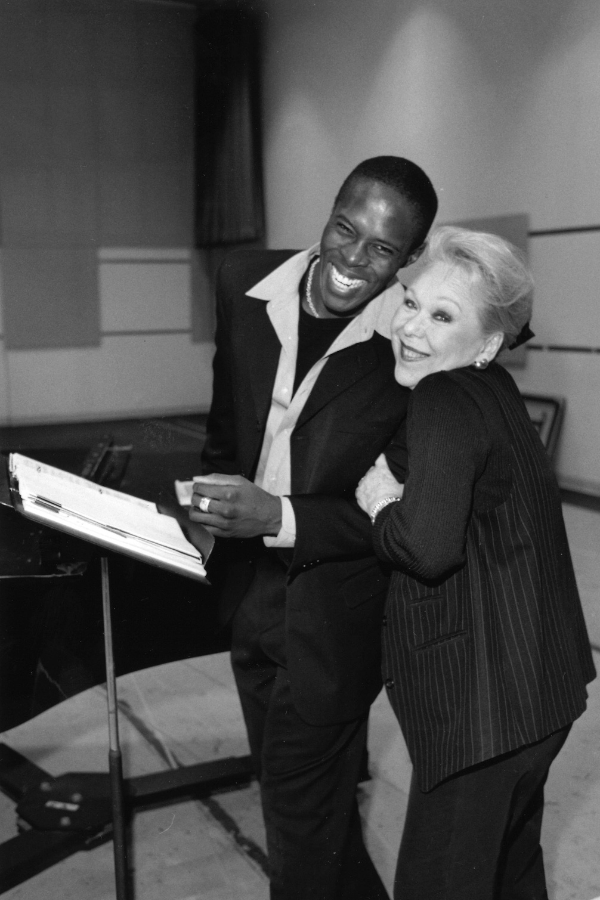
Ensemble tenor Kenneth Gayle gets some hands-on encouragement from Renata Scotto.
Between the tenures of Handt and Rolandi, the Ryan Opera Center enjoyed a series of visionary Directors: Lee Schaenen (1977-1991), Andrew Foldi (1991-1995), and Richard Pearlman (1995-2006). The administration later grew to include a Music Director and Director of Vocal Studies, positions held today by Craig Terry and Julia Faulkner. Ensemble positions of pianist, conductor, stage director, and stage manager have recently been added to reflect the training program’s leadership in nurturing the talents of artists across the full spectrum of the field. The program has also evolved to include international artists, further diversifying its talent pool.
Each season, the Ryan Opera Center attracts over 600 applicants from around the globe, competing for the coveted spots in the Ensemble. This level of interest reflects the Ryan Opera Center’s reputation as one of the premier operatic training programs in the world. Lyric Music Director Enrique Mazzola provides invaluable insights and mentorship to Ensemble members, as does Ryan Opera Center Advisor-at-Large Renée Fleming.
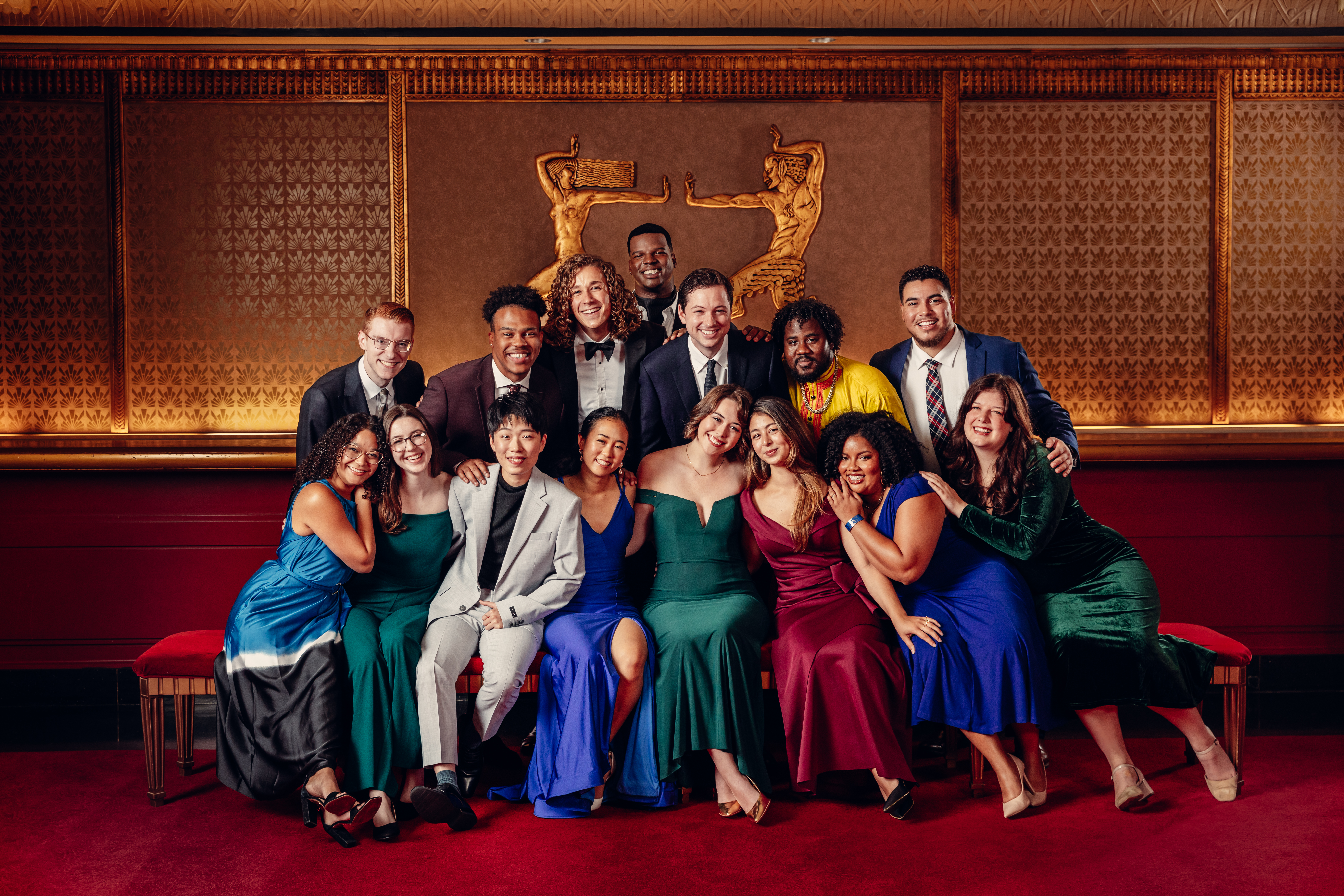
The 2024/25 Ensemble strikes a pose.
The achievements of the Ryan Opera Center’s alumni and current Ensemble members are a testament to the program’s impact. Graduates have gone on to perform in leading roles at prestigious opera houses worldwide, including the Metropolitan Opera, Royal Opera House, and Vienna State Opera. It’s no surprise that season after season over the past five decades, Lyric has welcomed home numerous distinguished alumni to perform in the Ardis Krainik Theater.
All the success and growth stem from the unwavering support and dedicated leadership established at the very beginning. “We owe a tremendous debt of gratitude to the hundreds of Ryan Opera Center Board members and donors, whose generosity made everything the program has accomplished possible,” says Novak. “We will always be grateful for their vision, investment, and advocacy to create the Opera Center 50 years ago and guide its growth. As we look ahead, we aim to build on this strong foundation, explore new opportunities for our artists, and ensure the Ryan Opera Center remains a beacon of excellence in artist development for the next 50 years and beyond!”
